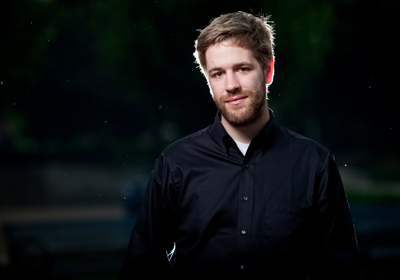by Rebekah Tilley
photos by Shaun Ring
When you ask UK University Scholar Dan Sheffler to name one of his favorite books, he immediate replies The Confessions of St. Augustine. Leaning back in his chair, his face lights up and searching the ceiling, he begins to describe why.
“I feel that when I read The Confessions Augustine is talking to me, as if he were directly addressing me,” Sheffler explained. “Even though it is all obviously addressed to God I feel like I’m sort of sitting in the room. I feel like I can completely relate to Augustine’s position in his life, and I can really connect with what he’s saying.”
“I think it is one of the most beautiful things that has ever been written in Latin. There are passages in it that are just shockingly beautiful.”
If this wasn’t your take on The Confessions, you may want to experience them the way Sheffler did by reading them in the original Latin. As a student in the Division of Classics of the UK Department of Modern & Classical Languages, Literatures, & Cultures, Sheffler can now read Latin as well as English and can experience the ancient texts of figures like St. Augustine in a way that is lost in the translated texts.
“Augustine was the court rhetorician or orator at Milan, which was one of the highest positions of rhetoric and speech giving in the entire Roman Empire,” said Sheffler. “He’s a master of writing, and a lot of that doesn’t come across in English. He’s constantly making wordplays or very skillful turns of phrase that really only come out in Latin.”
In addition to becoming a proficient reader of Latin, one of the unique features of the UK Classics Division is that students learn to speak what is commonly known as a “dead” language. Many of the upper level classes are conducted entirely in Latin.
But why bother?
“At first I didn’t really see the point of actually speaking the Latin, but as I got into it and took those classes and started speaking Latin actively, I was surprised how much more I really understood the Latin text that I was reading,” Sheffler said. “Instead of translating them into English in my head as I was going, I was just reading them and understanding them at that speed. And that has really helped me understand my favorite authors.”
 The Falls Church, Va., native has a strong family connection to the University of Kentucky. His grandfather was a former president of the UK Alumni Association and all his aunts and uncles on his mother’s side attended UK. His decision to attend UK was also, in part, a decision to become closer to this part of his family.
The Falls Church, Va., native has a strong family connection to the University of Kentucky. His grandfather was a former president of the UK Alumni Association and all his aunts and uncles on his mother’s side attended UK. His decision to attend UK was also, in part, a decision to become closer to this part of his family.
Yet he didn’t have Plato, Aristotle and St. Augustine on his mind as a freshman.
“Coming out of high school I didn’t think I was going to do anything hard core academically,” said Sheffler. Looking at Sheffler, this seems almost laughable. He is a double major in Classics and philosophy, will complete his masters degree in Classics this year, and has the beard, tweed jacket and leather satchel that smacks of academe.
Entering UK as an economics major, Sheffler quickly realized that it was not the field for him. He started taking Latin 101 and did well despite coming out of high school with only sign language for his language credits.
After a thorough grounding in Latin in the first four semesters, the program’s upper level classes switch to studying ancient texts, and by the 400 and 500 levels the primary focus of a class takes an in-depth look at a specific author or particular text.
“At that point it’s very much like what you would expect an English class to be, just conducted in Latin or Greek,” said Sheffler.
After he graduates, Sheffler plans to enter the Ph.D. program at the UK Department of Philosophy where he will specialize in ancient philosophy. He will bring with him a rich understanding of the languages his authors wrote as well as spoke.
Something he now shares with them.
